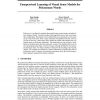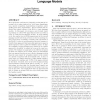184 search results - page 15 / 37 » Learning Expressive Models for Word Sense Disambiguation |
EMNLP
2010
13 years 5 months ago
2010
We describe a model for the lexical analysis of Arabic text, using the lists of alternatives supplied by a broad-coverage morphological analyzer, SAMA, which include stable lemma ...
COLING
2010
13 years 2 months ago
2010
Active learning has been applied to different NLP tasks, with the aim of limiting the amount of time and cost for human annotation. Most studies on active learning have only simul...
NIPS
2008
13 years 9 months ago
2008
Polysemy is a problem for methods that exploit image search engines to build object category models. Existing unsupervised approaches do not take word sense into consideration. We...
SAC
2005
ACM
14 years 1 months ago
2005
ACM
Because of name variations, an author may have multiple names and multiple authors may share the same name. Such name ambiguity affects the performance of document retrieval, web ...
CIKM
2011
Springer
12 years 7 months ago
2011
Springer
Word prediction performed by language models has an important role in many tasks as e.g. word sense disambiguation, speech recognition, hand-writing recognition, query spelling an...


